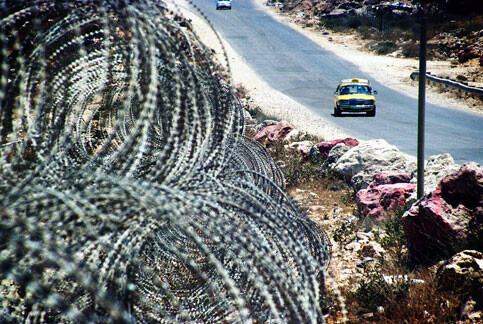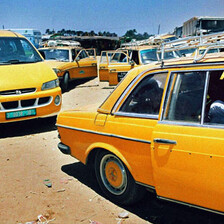West Bank 17 July 2003

A West Bank 8-seater service taxi trying to find its way to Ramallah. Israeli checkpoints make internal travel in the West Bank either impossible or an incredibly lengthy endevour, with simple journeys of 20 minutes taking several hours (Roland de Hommel)
Roula and I left Jerusalem early this morning to go�to Nablus to see some PCRF cases. It should be a 45 minute drive. Four hours later, we were still several miles outside of Nablus. There were 5 checkpoints between the Qalandia checkpoint and Nablus - each more barbaric and degrading than the next. We shared a service taxi (which seats 7, plus the driver) from Qalandia. Roula struck up a conversation with really nice man from Nablus, Abu Anais, who has a wife and seven children. He had gone to Jerusalem for a temporary job and was going home with a bag full of gifts for his wife and kids.
Roula told him we were trying to see Ahmad Hammami, a 2 year old Palestinian boy for whom the Palestine Children’s Relief Fund coordinated free heart surgery at Washington DC’s Children’s Hospital this past February. Abu Anais said not to worry, that he would help us find the family (we didn’t have an actual address, only a general neighborhood in Nablus… but he knew of Beit Hammami (“the Hammami household”). He also told us that if we could not find Ahmad and his family, or if we were delayed in any way, that we would be welcome to stay with him and his family. This is typical Palestinian hospitality and kindess to strangers that never makes the headlines.
Then we hit the next checkpoint. Israeli soldiers with armored jeeps blocked the road and were forcing all vehicles to stop. We were 5th in line. All of the vehicles in front of us — one medical supply van, a truck filled with bales of hay, a passenger car, and another service taxi — were forced to turn back. When the soldiers motioned us forward, he peered into the car, saw 7 men and 1 woman and told everyone to get out. He took our passports and the other guys’ ID’s - color coded, orange or green. This helps the soldiers decide who to single out for the most humiliating treatment.��
We were forced�to wait standing under an unforgiving sun in the scorching heat. One of the gunmen tried to speak to us in Arabic — a trap — but Roula and I responded that we needed him to speak English. We truly did. If Roula revealed that she spoke Arabic — with Lebanon stamped on her US passport as place of birth — who knows what would have happened. This 18-year boy with a big gun and a small conscience smirked the entire time at us as he sat in the shade of his vehicle while our papers were reviewed by one of the other gunmen. He finally came over and said we needed to go back. No explanations. No understanding of our situation. No desire to care. A heart of stone as hard as Pharoah.
The cab driver was not easily turned back. We turned off the main road onto an unpaved dirt road. I looked ahead at the rocky passage that seemed to go directly up the mountain. I was reminded of the passage from the book of Psalms: “I will lift up mine eyes unto the hills from whence cometh mine help.” Of course, I’m a selective chooser of verses because the same�Psalm goes on to say�”the sun shall not burn thee by day” — and today’s experience did little to help the sunburn I got waiting the 6 hours in the desert outside of Jericho on Sunday!
After 2 more checkpoints — or was it three, as they become a blur — we reached the final one before the main Huwarrwa checkpoint, notorious for its treatment of Palestinians as well as international visitors. And there we waited for an hour while they held Roula’s and my passports. Our cab driver was reluctant to leave us, but we told him we could not let him wait with a cab full of these good men on our account — men who shared with us gum, water, and humor. As Abu Anais said, “We laugh to keep from crying. What kind of life is this? Well, it is our life. So we laugh.”
So our mission to Nablus failed. We had to turn back towards Jerusalem. The driver took us as far as Bir Zeit, the seat of the great Palestinian center of learning, Bir Zeit University. The town and university are cut off from Ramallah by a checkpoint and road closure. The sea of humanity on either side of the closure was overwhelming: Pregnant women carrying their bags and small children… Old men with canes trying to navigate their way across the boulders and concrete squares that the Israeli gunmen decorate as dice. Truly, this is a game for them and a crapshoot for the Palestinians. Who can say if they will reach their homes? their children? their jobs? their classes? their appointments with the doctor?
All of this in the name of security? All of this humiliation and disruption? All of these instruments of apartheid and racism? All of these efforts to ethnically cleanse Palestine of its people? And all of this bought and paid for by billions of American tax dollars every year.
For Roula, this is her first real experience dealing directly with the occupation forces. And as a Palestinian witness to the crimes being committed against her own people while the world does nothing, it hit her hard. As much as I write, there really are no words to describe it. No pictures, no video footage. Nothing can communicate the truth about the barbaric acts of the Israeli military and government. One has to walk the dusty roads between checkpoints and climb the hills in a beat-up car for themselves to truly understand what’s going on here. And as much as I lift up mine eyes unto the hills, I see no help for this catastrophic situation. When will justice be served? How long O Lord?
The reason Roula and I had to turn back before seeing Ahmad and his family was that I had a late afternoon�meeting here in Ramallah regarding the new counseling project for Palestinian NGOs. Ironically, the�meeting with the Jerusalem Legal Aid and Human Rights Center. Legal obligations and human rights have no place in official Israeli vocabulary.��The director of the agency is from the West Bank. Because of Israel’s Apartheid system, he�can’t go to Jerusalem. It’s an abominable situation and every American should be outraged that our tax money supports this oppressive regime.
Daniel Quinn is a licensed clinical social worker with a local public school system. Last summer, he lived and worked for 2 months in the Gaza Strip and the West Bank, volunteering as a clinical consultant with the Palestine Children’s Relief Fund.



